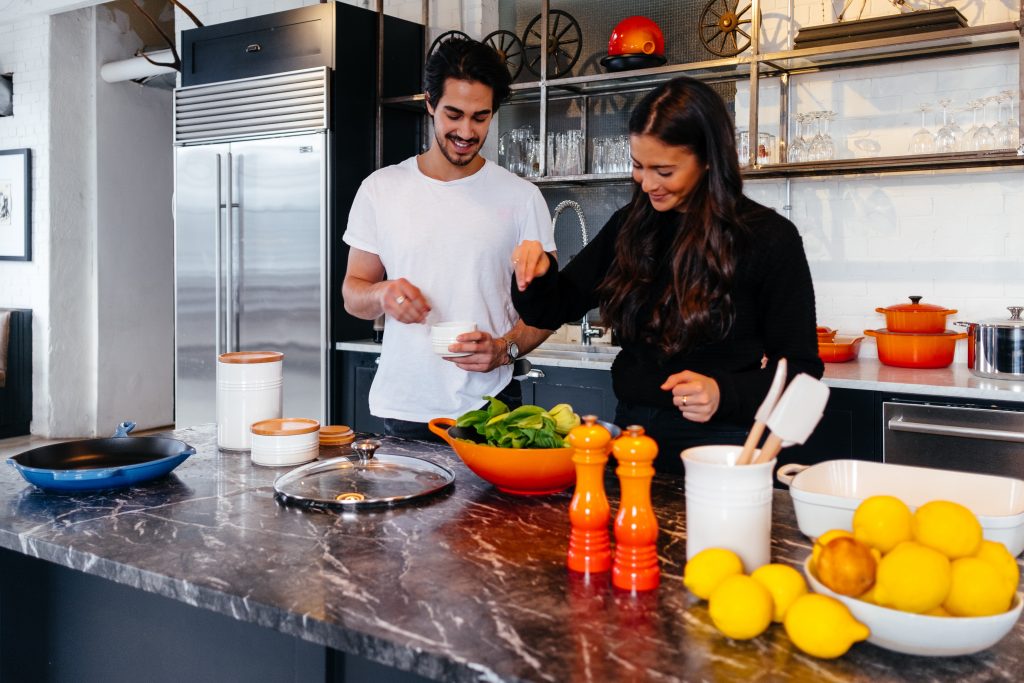Over New Years, a group of friends and I went off for a five-day camping trip where we had zero cell reception or internet. As sad as it sounds, I can’t remember the last time I had disconnected for such a long time and interacted with others with zero distractions.
Something I noticed immediately was the types of conversations we were having. And, the level of intimacy we were experiencing through these conversations, even with some people who I’d just met for the first time.
It got me thinking about what makes good conversations and why some are more meaningful than others. And specifically, why some dinner party conversations amazing, while others are painstakingly awkward.
For this post, I sifted through countless articles, blog posts, listened to podcasts, and interviews from best-selling authors, podcast hosts, journalists, and psychologists who’ve studied the science of good conversation. I discovered that to have better dinner party conversations (and conversations in general) we need to think less of ourselves, re-learn how to listen (because we all suck at it), and ask better and more engaging questions.
Let’s dig in.
5 Easy Ways to Have Better Dinner Party Conversations

1. Don’t be a conversation narcissist.
According to this Harvard study, talking about ourselves feels as good as biting into a creamy chocolate truffle or having good sex. The brain’s pleasure, reward, and motivation receptors light up when we talk about ourselves. It’s no wonder we spend 60% (or more) of our conversations talking about ourselves!
When we open up about personal thoughts and experiences, we display a sense of vulnerability, helping others connect with us on a deeper level. But as much as talking about ourselves feels good, it’s easy to get carried away and dominate a conversation. Or worse, take over a conversation when it wasn’t yours to take over in the first place.
To avoid shifting the dinner party conversation back to you, be supportive and respectful of the speaker by giving them responses that show you’re actually listening.
No, you don’t know how they feel.
Celeste Headlee, radio journalist, author, and public speaker has a popular Ted Talk, 10 Ways to Have a Better Conversation. She outlines some essential conversation tips in her talk, including one that I am guilty of doing regularly. Headlee recommends avoiding dominating a conversation by trying to equate your experiences to others.
For example, someone shares that their dog died and is obviously distraught. Instead of bringing up the time your dog died, listen to their story, and try and ask questions that keep the interest and conversation in their court. By bringing up your own experience, you’re devaluing the speaker’s story and shifting the conversation back to you (even though you’re just trying to show you know how they feel).
Sociologist Charles Deber dives deeper into this and recommends using support responses instead of shift responses. Support responses encourage the speaker to continue sharing their story instead of shifting the attention back to you.
For example:
The shift response (avoid)
- Sean: I’m so busy right now.
- Kim: Me, too. I’m totally overwhelmed.
The support response (use instead)
- Sean: I’m so busy right now.
- Kim: Why? What do you have to get done?
See what happened there? The support response isn’t turning the exchange’s focus onto yourself, even if you also happen to be super busy and can relate. You’re being supportive and are being a good listener.
Takeaway: Don’t be a conversation narcissist and be wary of shifting conversations back to you.
2. Put your phone away.
One super simple way to have better dinner party conversations is to remove anything that’ll distract you. And one of the biggest distractions in our lives is, you guessed it, our phones.
While you work, notifications on your phone or computer screen can kill your productivity. You immediately lose your train of thought and make you super inefficient. I honestly don’t understand how some people don’t turn off their notifications. The same rule applies to having conversations with people, especially during meetings, events, and dinner parties.
Notifications on your phone (even if they’re silent) distract both you as a listener and others around you. Your Whatsapp messages aren’t that urgent. Your hourly news reports about the pandemic will still be there after dinner. And if someone needs to get a hold of you, they’ll call.
By limiting your phone use at a dinner party, you’ll be a better listener, most likely ask more insightful and thoughtful questions, and will allow you to be present. Refrain from using it to show friends photos or to Google things unless it’s essential. Your friends will thank you for it.
Takeaway: As a guest, turn off notifications and keep your phone out of sight. If you’re the host, try making a playful game out of keeping phones out of the dinner party by suggesting that “the first person to check their phone has to host the next dinner.”

3. Be a better listener (and try the Improv Approach)
“If your mouth is open, you’re not listening.”
Buddha
Isn’t it annoying when you have a conversation with someone, and a few seconds in, you already know they’re not listening and are just waiting for you to stop talking so they can speak? It happens all the time, and it often happens at dinner parties.
We get fixated on something that pops into our minds and often can’t let go of it until we have the opportunity to share it with the group.
Unknowingly, we’re displaying poor listening skills. It’s obvious when you hear but don’t listen, especially when you fail to acknowledge their opinion before steering the conversation back to you.
“Trust that you’ll think of something in the moment based on what the other person just said. That will send a powerful signal to the other person that you’re truly listening to them.”
Adam Bryant
If you want to become a better listener, Adam Bryant, NY Times journalist, and best-selling author of , recommends using the Improv Approach.
No, you don’t need to be a drama star to use this approach. Improv is about having no script. Actors have to listen intently to their teammates, pick up on cues, and act and respond in the moment. They can’t prepare anything in advance, and because of this, their responses have to be genuine.
If we use the same approach when engaging in dinner party conversations, we limit the risk of cutting someone off, changing the subject, and jumping to conclusions. Your friends will appreciate your good listening skills, and you’ll respond with more thoughtful answers and better questions.
Other ways to show you’re a good listener include:
- Use body language. That means nod, lean in, and make eye-contact.
- Ask for clarification about things you don’t know.
- Avoid planning what you’re going to say until after they’ve spoken to let them voice their own opinions and thoughts.
Takeaway: Approach listening like you’re participating in an improv class and don’t jump to conclusions before the other person has finished speaking.

4. Work on your storytelling.
Everyone loves a good story. They’re in books, movies, tv shows, and beat out boring stats and figures, any day. Even listening to your uncle’s story for the fifteenth time, is still, somewhat entertaining.
Telling stories is easy. But, telling good stories is not.
We’re all guilty of rambling. We get overly excited and end up giving away too many details without getting straight to the point. Or, we don’t give enough details cutting straight to the punch line before giving your listeners a chance to get a grasp of what you’re talking about.
To be a better storyteller and be more engaging and dinner parties, I picked up on some storytelling cues from this Art of Manliness podcast where storytelling expert, Matthew Dicks, shares his tips.
It’s definitely worth a listen.
Tip: Practice telling stories to your partner, friend, or family members using Dicks’ techniques.
To have better dinner party conversations, try some of these tips out next time you’re telling (or thinking) about telling a story.
- Start with the end. Ask yourself: “What’s the purpose of this story?” And then, “What is the moment of transformation and realization?” It needs to be clear for both you (and the listener) what you’re aiming at before you start your story.
- Ditch the details. The trick of telling stories is: “don’t tell us everything,” Matthew says. By carefully eliminating unnecessary information such as people, places, or things, you can focus on the things that add value and meaning to your story.
- Practice Homework for Life. Keeping a daily journal of everything that happens in your day is difficult. Instead, try to record bite-sized memories and stories to help your brain trigger future memories and stories. Think of one thing that happened today that was weird, funny, unusual, scary, or exciting, and jot it down on your phone or in a little book. You’ll soon realize that you have more stories. More on Matthew’s Homework for Life available here.
Takeaway: Stop boring people with your long, drawn-out stories and cut straight to the chase by starting with the end and working backward.

5. Ask better questions.
One easy way to have better dinner party conversations is to avoid asking boring questions.
Tim Ferriss, Joe Rogan, and countless other successful authors and podcast hosts who interview people for a living, recommend asking open-ended questions.
By asking these sorts of questions, you empower the speaker to share additional information (that otherwise might never have been shared) and stimulate better conversation.
How do you ask open-ended questions?
Good question.
Questions with “would,” “should,” “is,” “are,” and “do you think” all lead to yes or no answers, so steer clear of these. Questions with “who,” “what,” “where,” “when,” “how,” or “why” lead to people giving some thought to their answers and provide much more information.
Better dinner party conversation starter questions:
- “Tell me about yourself” instead of “what do you do for work?”
- What was the coolest thing that happened to you this week?
- “What’s your story?” instead of “how do you know the host”?
Remember to ask follow-up questions that’ll give you the speaker’s opinions about ideas, not just facts. You can follow-up by asking something like, “What makes you say that?” or “Why do you think that is important to you?”
Takeaway: Ask open-ended and follow-up questions to help stimulate more in-depth conversation.
Have a Conversation With Somebody About This
Share the knowledge you’ve learnt in this post by sharing it with somebody else. And leave a comment below if you have another tip or suggestion that I missed.



